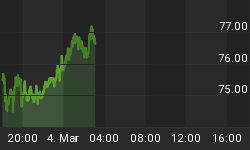China remains in a structural "up" market we think. It would be a mistake to jump off its equity market or currency during times of apparent crisis.
A bit of context and history is needed.
Firstly, Chinese financial markets only have three speeds -- boom; bust or comatose. This is both a cultural characteristic as well as structural. The current volatility is hardly outside of historical norms.
The media has been captured by the 30% decline in equity markets over the past month, but fails to mention that ASHR (a China ETF we use as a representative proxy) first rose 163% in the 12 months previous. Early investors are still deep in the money.
Tellingly, Chinese financials have been relatively stable as have the larger capitalization stocks that typically would be bought by foreigners. That partly reveals that the recent market downturn has been driven by local investors.
Policymakers, we think, are savvy to "animal spirits" and perceived "one way bets." Last year the PBOC (People's Bank of China) successfully shook off Yuan speculators. They are now allowing market realities to chasten speculative, and levered, equity market investors. This had to occur at some point. Indeed, a taming of the "animal" spirits had been deliberately planned. That said, no doubt policymakers were somewhat surprised at the ferocity of an over-leveraged equity market. Downsides are hard (if not impossible) to contain.
Looking ahead, developing a reserve status for its currency (the Yuan) and wide and deep equity markets are key reform strategies of the Chinese government. However, it is not necessary that stock markets soar at a pace of 150% a year to do so. By Western standards, 20% gains a year would be heavenly enough. Policymakers have learned their lessons from the last equity market boom (several times bigger than witnessed recently) in 2008. It ended ignobly.
Are we worried about China's economy? No. The Chinese equity market has never had any positive correlation to their economy. Therefore, the recent equity market decline will have virtually zero impact on recent economic trends. Yes, economic growth is slowing; no longer on a hyper-speed pace of 10% growth per year. The current pace of growth of around 4% or so, is still faster than any other major economy in the world.
Important to recognize is that China, in one respect, is going down a similar path as did Europe and most other major central banks. As economies slowed, massive monetary stimulation and interventions were enacted, thus boosting financial asset prices in face of slowing/sluggish economies.
As the "industrial circulation" of money is slowing, it is expanding in the "financial circulation." That drives up prices of financial assets.
Another positive force for Chinese equity markets is far from being played out. As household incomes climb in developing nations, demand for consumer goods (also luxury goods) rises much faster. This is also true for investment products (i.e. equity markets).
The experience of Taiwan in the 1990s was a prime demonstration of this phenomenon. There, the equity market shot up by a factor of 10X between 1985 and early 1990. It subsequently collapsed by 75%. China, however, is therefore wise to the consequences of run-a-way bull markets.
We remain attracted to the non-correlation of the Yuan and Chinese financial markets, as well as the supportive outlook for Chinese equities. China is still expected to be added to the MSCI indices sometime over the next 2 years. That will put this 2nd largest stock market on the map for international investors. That will trigger a large demand for Chinese equities.
But ... but ...? Volatility will remain high and a standard feature of Chinese equity markets for some time to come. This must be accepted and understood to be part of the risks and opportunities of this market.















